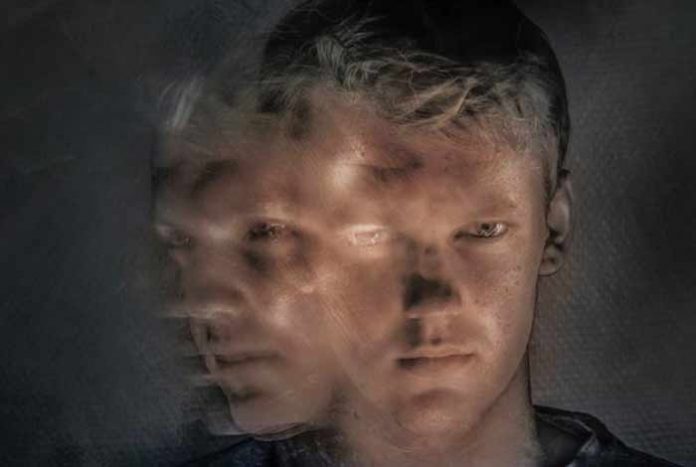
Overview and Facts
Schizophrenia is a complex, chronic mental disorder, which is characterized by abnormal social behavior and inability to distinguish real from unreal. It usually affects people in late adolescence or early adulthood. It interferes with a person’s ability to think, take decisions, manage emotions and relate to others. Some common symptoms associated with schizophrenia are delusions, hallucinations, lack of concentration and lack of motivation. This lifelong disease has no cure at present, but with proper medication, its symptoms can be managed effectively. People having Schizophrenia are often diagnosed with other mental disorders as well, such as anxiety disorder and depression. The roots of this disorder are laid during the development of a fetus and at the time of birth, while its symptoms develop later in life.
It is a common disease, and it affects approximately 1% of the global population and about 1.2% of the total U.S. population. Men and women display different patterns of symptom development. Men have the maximum probability of developing schizophrenia in the age group of 18 to 25 years, whereas women have the maximum possibility at the age group of 25 to 30 years and then, at around 40 years of age. The disease is partially genetic. For a person to be diagnosed with Schizophrenia, he/she should show consistent symptoms for at least six months. It can be fatal as the patients are known to have high suicidal tendencies. Schizophrenia is known to be one of the most expensive mental disorder.
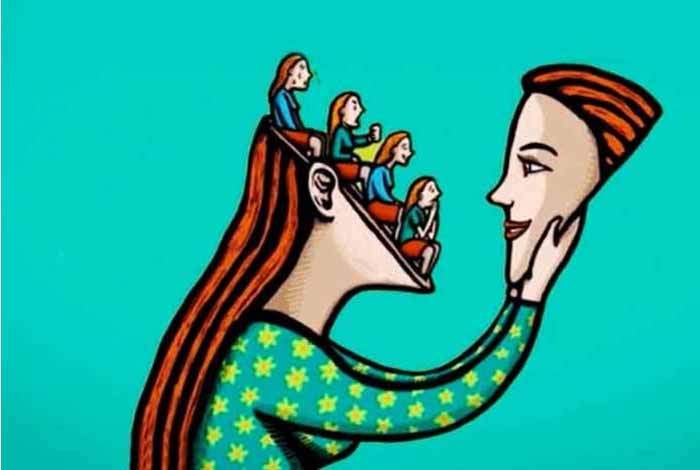
Types and Symptoms of Schizophrenia
According to The International Classification of Diseases, there are different types of Schizophrenia:
1) Paranoid Schizophrenia
It is a common form of Schizophrenia in which prominent hallucinations and delusions occur. It is known to develop at a later stage than other types of schizophrenia. Paranoid behavior is marked by a feeling of persecution or of being watched. Patients might develop anger, anxiety and hostility. However, the schizophrenic has normal intellectual functioning and expression.
2) Hebephrenic Schizophrenia
In this, the patient has disorganized behavior without any purpose. The patient has disorganized thoughts, which the other person has difficulty to understand. The person has a tendency to throw pranks and giggles uncontrollably and shows false health complaints. The patient has short-term delusions and hallucinations. It generally develops in people in the age group of 15 to 25 years.
3) Catatonic Schizophrenia
It is rarer than other types of schizophrenia. The person shows unusual movements and switches between being hyperactive and being extremely still, known as Catatonic excitement and Catatonic stupor, respectively. In catatonic excitement, the person might show repetitive but purposeless actions. He might also mimic other person’s actions (echopraxia) or speech (echolalia).C
4) Undifferentiated Schizophrenia
In this type, the patient’s symptoms cannot be categorized into any one type because the patient shows some signs of paranoid, hebephrenic and/or catatonic schizophrenia.
5) Residual Schizophrenia
This type of schizophrenia is diagnosed when a person shows only the negative symptoms of schizophrenia, such as absence of emotional responses, reduction in speech, apathy, social withdrawal, impaired attention and lethargy. It generally develops in people with a history of schizophrenia. Positive symptoms like hallucinations or paranoia develop less frequently.
6) Simple Schizophrenia
In this, negative symptoms are more prominent and develop in a short span of time. Positive symptoms are rare.
7) Cenesthopathic Schizophrenia
Patients with cenesthopathic schizophrenia experience unusual sensations in their body. These sensations are described as the psychopathological symptoms of schizophrenia.
8) Unspecified Schizophrenia
In this, the patients develop general symptoms of schizophrenia, but the symptoms don’t fall in any one of the above categories.
However, in the Diagnostic and Statistical Manual of Mental Disorders 5th Edition (DSM-V), the method of classification was changed to bring all types of schizophrenia under one umbrella, Schizophrenia. According to the American Psychiatric Association (APA), these types were merged because they had “limited diagnostic reliability and poor validity.” By classifying the types of schizophrenia, there was little or no benefit to the patients; neither did it predict how the patient would respond to the treatment. Other important changes that were made in the diagnostic criteria were:
The requirement for a patient to feel bizarre delusions and to hear two or more voices talk during auditory hallucinations to be diagnosed with having positive symptoms of schizophrenia.
The requirement for a person to show at least one of the symptoms of hallucinations, delusions or disorganized speech to be diagnosed with schizophrenia.
Schizophrenic patients experience a variety of symptoms; some of them are classified as positive, a few as negative, while others as cognitive symptoms.
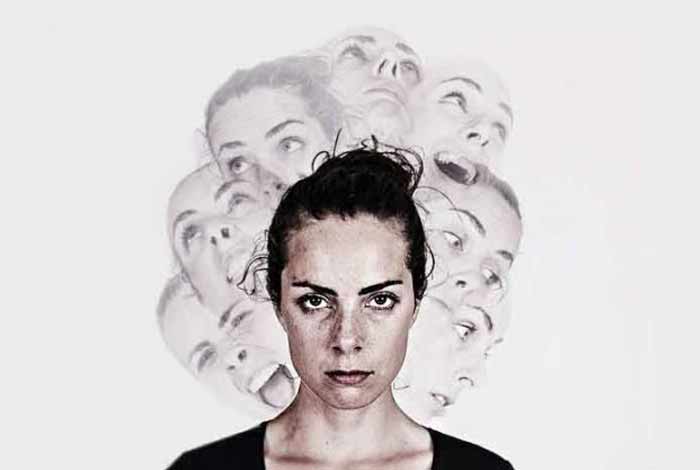
a) Positive Symptoms
1) Hallucinations
In this, the patient sees, hears, smells or feels things that no one else does. These patients generally hear voices in their heads. These voices try to warn them, say mean things to them or direct them what to do. Sometimes the voices might even talk to each other.
2) Delusions
In this, the patient feels that someone else is controlling their mind through television or that the police is looking for them. They might also believe that they possess superpowers.
3) Confused Thoughts and Speech
Patients have difficulty organizing their thoughts and might even have trouble following the other person’s speech. They might appear to be lost or zoned out. When they talk, the speech does not make sense.
4) Trouble Concentrating
Patients find it difficult to concentrate. For example, they might lose track of what they are watching on the television.
5) Different Movements
Patients have undefined movements. Sometimes they might seem jumpy, sometimes they make repetitive movements or at time, they remain perfectly still for hours at a stretch. This is known as catatonia. Contrary to general belief, these patients are not violent.
b) Negative Symptoms
1) Apathy
In this, the person shows lack of interest in activities that he/she earlier found interesting. The person might also stop taking care of his appearance and personal hygiene. Patients might even become reluctant in leaving the bed and may remain in bed for a larger part of their day.
2) Absent, Blunted or Incongruous Responses
People display no reaction to good or bad news or react inappropriately to any piece of news. They might laugh at a sad news, or become extremely sad when hear good news.
3) Reductions in Speech
The Person appears to lose interest in conversation and give only brief responses to questions. His/her speech becomes interrupted and may contain long pauses. This is known as “poverty of speech.” A person with such symptoms has no ability to make small talks and is unable to take part in social activities. This is called alogia. Sometimes, the person might become completely mute.
4) Social Withdrawal
The person might neglect all of his social contacts and prefer spending time alone. The person has a general lack of will to interact with the outside world. This behavior is called avolition.
5) Impaired Attention
The person has difficulty concentrating. His/her attention shifts during conversation and is unable to concentrate on simple tasks.
6) Anhedonia
This refers to the inability to experience pleasure. The person with this symptom often label his/her life as being gray or empty; devoid of normal ups and downs.
7) Sexual Problems
Reduction or complete loss of libido is experienced by the patient. Men might experience erectile dysfunction, and both men and women find it difficult to achieve orgasm, known as anorgasmia.
8) Lethargy
The person feels extreme lack of energy and finds it difficult to do anything more than those activities that require least amount of energy. Such people usually spend most of their time in the bed.
c) Cognitive Symptoms
The patient has a difficult time managing his working memory. They might lose track of different things, such as phone numbers and instructions. Besides having difficulty in concentrating, it becomes tough for them to organize their thoughts and make decisions.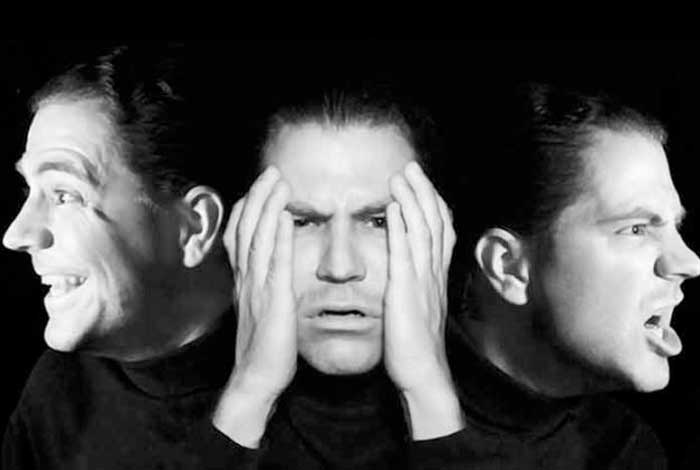
Risk Factors of Schizophrenia
Schizophrenia is known to have several causative factors. Also, there are many factors that increase a person’s chance of developing schizophrenia. These include:
-
Genetic factors
-
Prenatal and perinatal stressors
-
Infectious agents
-
Childhood and adulthood trauma
-
Substance abuse
-
Maternal illness or complications during pregnancy
-
Being born during winter months
-
Maternal exposure to the toxoplasmosis parasite
-
Structural or functional abnormalities in brain like enlarged ventricles, metabolic differences and differences in size of certain areas of the brain
-
Drop in childhood IQ scores
-
Having obsessive-compulsive disorder
-
Being left-handed
-
Having an older father
-
History of epilepsy in the family
 Do I Have Schizophrenia?
Do I Have Schizophrenia?
If you feel any change in your thinking pattern or you start hearing voices in your head that direct you to do certain things, or you feel like you have some magical powers and you are different from others; then, it is recommended to discuss these symptoms with a doctor. If you further think that no one is getting what you are saying, rather everyone says that you are incoherent or that you find yourself unable to speak, then you should consult a mental health professional.
Also, if you find yourself unable to get out of the bed throughout the day or that you have stopped enjoying things that you liked before like reading, watching TV and listening to music, then it would be good to see a doctor and get yourself checked. These symptoms are also associated with bipolar disorder, substance abuse, depression with psychotic feature, and due to poor interaction of combined medications. It is best to get your symptoms checked by a doctor.

Causes and Prevention of Schizophrenia
The exact cause of schizophrenia is unknown, but a combination of risk factors, including genetics, environmental factors and brain chemistry, are thought to develop schizophrenia. Imbalance in neurotransmitters like dopamine and glutamate might also contribute to the development of schizophrenia. Schizophrenic patients show abnormality in brain structure and central nervous system. However, the relationship between these changes and schizophrenia is still unknown.
1) Genetic factors
Schizophrenia is known to run in families, but no single gene has been found to be responsible for causing the disease. Different combinations of genes are thought to be responsible for the development of the disorder. It is also postulated that having these genes do not necessarily guarantee that the person would develop schizophrenia.
2) Brain Development
Patients with schizophrenia are known to have some differences in their brain anatomy. These differences are not found in all patients alike and can even occur in people without mental disorders. However, these differences indicate schizophrenia being a brain disorder.
3) Neurotransmitters
These are the chemical messengers found in brain. Drugs that alter the levels of neurotransmitters in brain are known to have a positive effect on symptoms of schizophrenia. Hence, neurotransmitters are thought to play some role in schizophrenia development. Some research suggests that it might be caused due to imbalance in the levels of dopamine and serotonin in the brain, while others show that schizophrenic patients have altered sensitivity for these neurotransmitters.
4) Pregnancy and Birth Complications
It has been found that people, who develop schizophrenia, had suffered from some complications before and during their birth like low birth weight, premature labor or lack of oxygen during birth. These stressors are thought to cause some effect on brain development.
5) Triggers
There are a few factors that can cause development of schizophrenia:
-
Stress
Stressful life events such as bereavement, loss of job, divorce, physical, sexual or emotional abuse can trigger development of schizophrenia in people, who are already at high risk of developing the disorder. Stress alone cannot cause schizophrenia.
-
Substance Abuse
Drugs that affect neurotransmitters in the brain are thought to increase chances of developing schizophrenia in people, who are susceptible. This includes cannabis, cocaine, LSD, amphetamines and so on. Use of amphetamines and cocaine is known to cause psychosis, and is also believed to cause relapse in people recovering from earlier disorder.
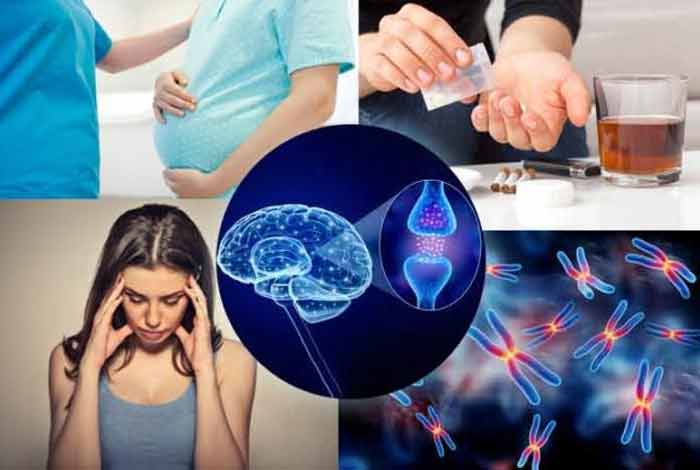
Diagnosis and Tests of Schizophrenia
Diagnosis of schizophrenia involves ruling out the probability of other mental disorders and determining that these symptoms are not caused due to other reasons, such as substance abuse, medication or medical condition. Other major problem associated with diagnosis of schizophrenia is that the patients refuse to admit that they have some mental disorder. Lack of general awareness about the disease is also a limiting factor in diagnosing the disorder correctly.
Diagnosis of schizophrenia includes the following:
1) Physical Examination:
This helps in ruling out other health problems that might be causing the symptoms similar to those of schizophrenia, and to determine any related complications.
2) Tests and Screening
It includes tests that are employed to rule out other causes of such symptoms. A person might be screened for alcohol and substance abuse. Imaging studies such as MRI or CT scan might also be considered to examine any structural differences in brain.
3) Psychiatric Evaluation
Mental status of a person with the symptoms of schizophrenia is evaluated through psychiatric methods. His appearance and demeanor are observed, and inquiry about his thoughts, moods, delusions, hallucinations, substance abuse etc. is made. Discussions with the patient’s family is also done.
4) Diagnostic Criteria for Schizophrenia
The symptoms of a patient are evaluated against the guidelines specified in the Diagnostic and Statistical Manual of Mental Disorders (DSM-5), which is published by the American Psychiatric Association (APA).
If the signs for schizophrenia are presented for more than a month, but less than six months, it is considered as schizophreniform disorder – a condition which the symptoms of schizophrenia are present for a significant period, but not long enough to be considered as schizophrenia.
Symptoms lasting for less than a month are classified as brief psychotic disorder. Schizophrenia is diagnosed only when the symptoms are present persistently for six months or more.

Treatment and Care of Schizophrenia
Schizophrenia is a life-long condition and requires treatment even when the symptoms subside. Treatment with medications and psychotherapy is found to be effective in most of the cases. However, hospitalization might be needed in severe cases. In general, to take care of a schizophrenic patient, a team is formed, comprising a psychologist, social worker, psychiatric nurse and case manager. Such a team is only available in clinics that specialize in schizophrenia treatment.
1) Medications
Anti-psychotic medications are prescribed that affect the neurotransmitters and are used to control the symptoms. The aim is to manage the disorder at the lowest possible dose of medications to avoid side effects. Several combinations of drugs at different doses are tried and tested over time to achieve the desired result.
Non-cooperation from patient poses a major threat to deliver proper treatment. Side effects from trying different combinations of the drugs also make the patient unwilling to take the prescribed drugs.
Some of the second-generation antipsychotics that help treat the symptoms of schizophrenia include:
-
Aripiprazole
-
Clozapine
-
Alanzaprine
-
Paliperidone
-
Risperidone
First generation antipsychotic drugs that are used to treat the symptoms of schizophrenia are:
-
Chlorpromazine
-
Haloperidol
-
Fluphenazine
First generation antipsychotics are known to cause serious side effects, such as tardive dyskinesia in which the patient develops movement disorders.
Other types of medications that are prescribed for managing the symptoms of schizophrenia are:
-
Antidepressants
-
Mood stabilizers
Generally, prescribed antidepressants belong to the sub categories – tricyclic antidepressants, viz., amitriptyline, imipramine and selective serotonin re-uptake inhibitors (SSRIs) like citalopram, fluoxetine, fluvoxamine and sertraline. SSRIs are found to be safer and easier for people to tolerate.
Mood stabilizers, such as lithium are prescribed for people with severe mood swings.
3) Psychosocial Interventions
Once the symptoms of psychosis subside, along with the medication, psychological and social interventions are important to be integrated in the treatment plan. These include:
-
Individual Therapy
In this, efforts are made to normalize the thought process of the patient. Also, stress management techniques are taught to the patient to help him manage anxiety and identify early signs of relapse.
-
Social Skills Training
It focuses on improving communication and social skill of the patient to help him get back to society. They are trained to improve their ability to participate in daily activities.
-
Family Therapy
Through this, families of the patients are educated about the disorder and provided with help to deal with the patient.
-
Vocational Rehabilitation and Supported Employment
It focuses on helping schizophrenic patients to prepare for, find and keep their jobs.
Most of the schizophrenic patients require some or the other form of support to help them deal with their daily life. There are many communities that help people with schizophrenia find jobs, housing, self-help groups and manage crisis.
With appropriate treatment and help, most of the patients are able to lead a near normal life.
4) Hospitalization
During a crisis or when the symptoms present themselves in their most severe form, hospitalization might be required to ensure safety of the patient, proper nutrition, adequate sleep and basic hygiene.
5) Electro Convulsive Therapy (ECT)
In severe cases, when medications do not show any effect, ECT might be considered.
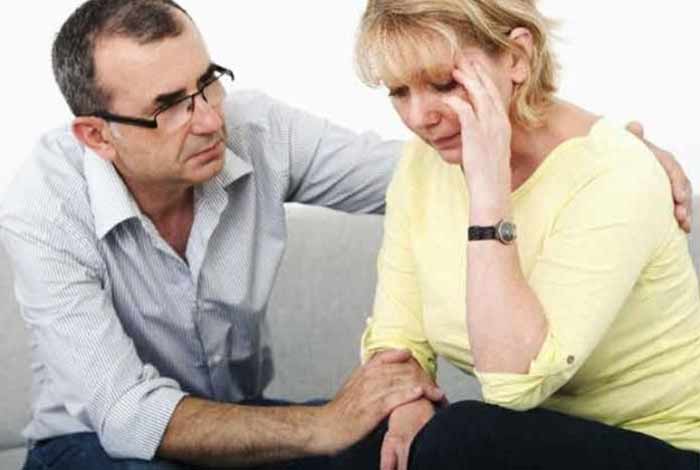
OTC Medications and Self-Management Methods for Schizophrenia
There are no over-the-counter medications available for managing schizophrenia due to severe side effects associated with the medications used to manage the disorder. There is also a potential danger of misuse of antidepressants as drug abuse. A few nutritional supplements can be effective to some extent. But, it is recommended to take even supplements only after consulting a medical practitioner.
Self-management of disease involves recognizing delusions. The person can train him/herself for developing counter arguments and search for alternative interpretations. The final step involves replacing delusion with reality. Some of the common goals for self-managing schizophrenia are:
-
Accepting experiences
-
Struggling against societal stigma
-
Journeying through different understandings of sickness-related experiences, which includes psychiatric, social and spiritual.
-
Developing coping strategies
Along with medication, the person should engage in communicating his/her experience of illness as well as coping mechanisms for delusions, paranoia and negative thoughts about him/herself.

Natural Ways to Treat Schizophrenia
Schizophrenia is a serious disorder, which should be treated only under the supervision of a medical practitioner. These natural ways and home remedies can be used to calm the mind and manage a few symptoms.
Following are some of the herbs that can be used to manage the symptoms of schizophrenia:
1) Panax ginseng
It is known to improve memory, thinking and concentration. In a 2008 study by Canadian researchers, this herb helped in managing some of the negative symptoms of schizophrenia. It is thought to have some effect on brain receptors for neurotransmitters; just like antipsychotic drugs.
2) Maidenhair Tree (Ginkgo biloba)
It is known as an adjunctive agent for treating schizophrenia as it might help in enhancing effectiveness of antipsychotic drugs. It is also thought to protect against neural damage caused by antipsychotics.
3) Fish Oil
schizophrenic patients are known to have low levels of omega 3 fatty acids as the disease causes depletion of certain fatty acids. Fish oil supplements are known to reduce the symptoms of schizophrenia. According to a 2010 study published in the Archives of General Psychiatry, omega 3 polyunsaturated fatty acids can help in reducing the risk of developing psychotic illness.
4) Waterhyssop (Brahmi)
Brahmi is commonly used in Ayurvedic medications for enhancing cognitive ability. Some studies show that it can help reduce symptoms of schizophrenia.
5) Antioxidants
Antioxidants like vitamins A, C and E are thought to be helpful in decreasing the symptoms of schizophrenia.

Health Tip by Experts
Schizophrenia is a severe mental disorder which requires life-long therapy. It is extremely important to identify the symptoms and seek immediate medical care. The taboo associated with mental disorders should not stop the patient from seeking medical attention.






